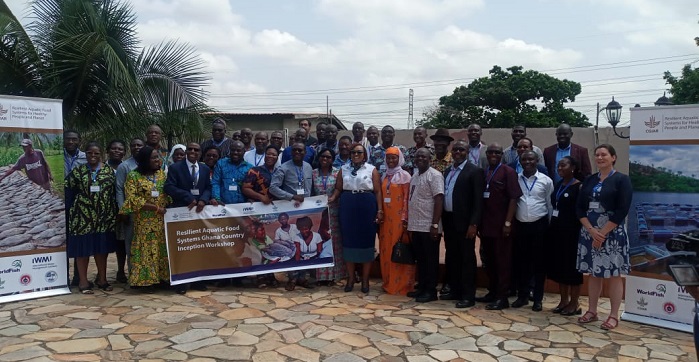Climate Change & Energy
One Village One Dam project to benefit from fisheries production
Source: ghenvironment.com - June 20, 2022

Mrs Koomson (middle) with participants of the programme
One of the government’s flagship programmes called One Village One Dam (1V1D) is set to benefit from fisheries production through the help of the Resilient Aquatic Food Systems initiative.
Aimed at contributing to the country’s food security as well as its developmental agenda, the initiative proposes the integration of aquatic production into water resources management plans to support the country’s food production systems.
It is established by the Consultative Group on International Agricultural Research (CGAIR) to expand smallholder productivity, increasing nutritional outcomes and offering opportunities to benefit from fish value chain, specifically for women and youths.
Spearheaded by one of CGAIR’s constituents, International Water Management Institute (IWMI), the initiative is also in collaboration with the Fisheries Commission, Council for Scientific and Industrial Research (CSIR), MOFAD, Northern Development Authority and district assemblies.
Speaking in an interview with ghenvironment.com at the launch of the initiative in Accra, Dr Everisto Mapedza, Senior Researcher at the IWMI said, using the 1V1D infrastructure is to help increase productivity by producing fishes within the infrastructure.
On the sustainability of the project using the 1V1D which sometimes lacks water, the Senior Researcher revealed that, as part of the project, they would be working with different government departments to ensure its sustainability.
He said “We are aware of the risks that are associated with some of the dams and one of the things that we are starting to do for instance in some Northern Regions where we have identified through remote sensing to look at which dams and what happens to them over the dry season, so we don’t want to recommend aquaculture production in a dam which is going to dry”.
“So, our remote sensing unit is already identifying that and we are mapping and identifying dams which are always having water throughout the year. We are also investing money into the project and don’t want all the fish to die, so it is one thing we are quite aware of and we are working with the different government departments to ensure that, we promote something which is sustainable”, he added.
The Minister of Fisheries and Aquaculture Development (MOFAD), Mrs Mavis Hawa Koomson, assuring the success of the programme said, government acknowledged the potential in the aquaculture subsector for which reason the initiative had come at an opportune time.
“This is in line with my Ministry’s Medium Term Development Plan (MTDP) and our flagship ‘Aquaculture for Food and Jobs Project’ currently on-going across the country,” she added.
Mrs Koomson said her ministry would provide support and strategic directions to ensure that all the aquaculture activities under the programme were aligned with ongoing initiatives.
“I further expect the programme to introduce innovations in the fish market value chain engagements to ensure that the aquaculture production is well aligned with the fisheries value chain,” she stated.
“The Ministry of Fisheries and Aquaculture Development will continue to ensure that fisheries and aquaculture are sustainably managed and developed for the benefit of both present and future generations,” she added.
The Minister indicated that the programme would collaborate with Fisheries Commission and the Council for Scientific and Industrial Research (CSIR) to co-design innovative packages that allows the integration of aquaculture into small water infrastructures within the existing framework of One Village One Dam strategy implementation.
“The One Village One Dam Project was an initiative of my former Ministry and I am happy that the initiative will be beneficial to a programme under my current ministry,” she added.
Dr Olufunke Cofie, Country Representative, IWMI, said the government had already rolled out initiatives so they were coming in as a knowledge institute to assist such initiatives.
“We want to support by ensuring that we are able to build a resilient aquatic food system in Ghana. We are working together with our other CGIAR centres to ensure that we have the right data, addressing the problems that are constraining the productivity for the right decision to be made in the implementation process,” she stated.
Dr Cofie said the institute would work jointly with the local partners to co-design the innovative packages that would facilitate the achievement of the initiative’s aim.
Dr Kwesi Atta-Krah, Director, Regional and Country Engagement Advisor, CGAIR said the initiative would have strong links with other initiatives of the government that related to aquaculture, water and food systems.
 Mrs Koomson (middle) with participants of the programme
Mrs Koomson (middle) with participants of the programme


